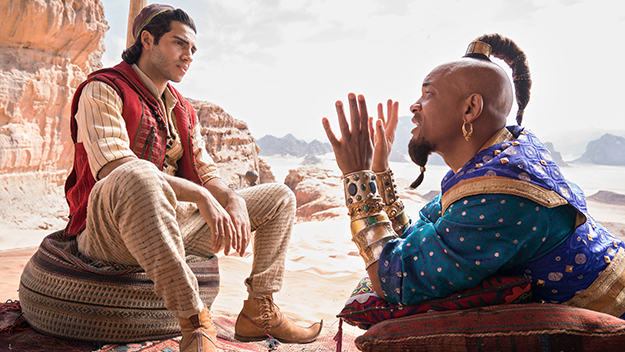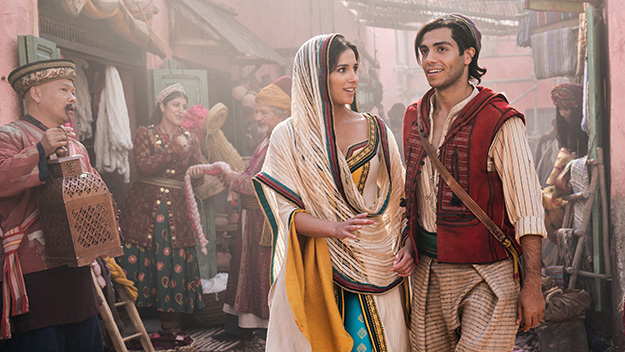Deep Focus: Aladdin

Images from Aladdin (Guy Ritchie, 2019)
Disney’s remake of Aladdin features human actors and digital creatures, but don’t call it “live-action.” Maladroit and overlong, its resting state is moribund. The digital accoutrements of Will Smith as the Genie imprison him as much as the wild 2-D caricature art of the Disney cartoon liberated Robin Williams. Director Guy Ritchie (who shares script credit with John August) told Entertainment Weekly that he envisioned “a muscular 1970s dad . . . He was big enough to feel like a force—not so muscular that he looked like he was counting calories.” I guess the final product is true to this vision of Papa Joe Six Pack sporting blue skin, a tightly woven top knot, and a beard that looks like a chin knot. But what does a 1970s dad have to do with a cartoon produced in 1992, or a pop superstar like Smith, who broke out in the ’80s and ’90s, or a piece of Middle Eastern folklore that dates back to antiquity?
Influenced by the curling line of Al Hirschfeld’s quill-and-ink drawings, Williams’s Genie had a protean shape: improbably top-heavy, with a bulging torso trailing down into wisps, and a malleable mug. A quick-change artist and mimic who expressed his darting thoughts with lightning impersonations of everyone from Arnold Schwarzenegger and William F. Buckley Jr. to Arsenio Hall and Ed Sullivan, Williams’s Genie introduced Disney to the untamed adolescent id. Smith’s Genie is more like a cool uncle past his prime. He’s perfectly (pardon the expression) genial. But where Williams was eruptive, Smith is self-conscious from the moment that rapscallion Aladdin (Mena Massoud) summons him by rubbing the magic lamp. “You really don’t know who I am?” he asks. “Genie, wishes, lamp, none of that ringing a bell?” In Williams’s opening spiel he introduced himself as “The often imitated but never duplicated Genie of the Lamp.” You can say that again.
I loved John Musker and Ron Clements’s animated feature, but I hadn’t seen it since it opened. (I took another peek after seeing this version.) They did such a good job of injecting humor into its diverse parts—fairy-tale and adventure sequences, camp excesses, Broadway/Hollywood setpieces—I’d forgotten that it was a musical comedy until I saw the remake. In the Musker-Clements cartoon, when Aladdin takes Princess Jasmine on a magic carpet ride in “A Whole New World,” they startle an Egyptian worker, who accidentally knocks the tip off the nose of the Sphinx. Nothing that playful happens here. In 2019, Jasmine (Naomi Scott) wouldn’t be considered a role model if she simply wanted to wed Aladdin, the Robin Hood–like street thief she loves, instead of agreeing to an arranged marriage with a prince. Now she also wants to follow her father to the throne as the Sultan. I’d say more power to her if she didn’t periodically stop the movie cold with her proclamations of personal empowerment and solidarity with her people. A social-political epiphany—that’s what Ritchie and company feel will complete the fantasy escape of “A Whole New World.”

As a musical director, Ritchie is all thumbs and big toes. He tries to turn each number into anything but a song-and-dance. Aladdin’s tumbling showpiece no longer skips and prances between athletic leaps as the handsome urchin stays “A Step Ahead” of the law. It’s just a demonstration of parkour. When the script does suggest a choreographic idea, such as the Genie, by wizardry, manipulating Aladdin’s body so it looks as if he’s dancing, Ritchie fails to build the gag rhythmically. The only way he can get a laugh, as the dialogue later acknowledges, is to go “over the top.” (When Smith pops a rap dance move in “Prince Ali” or “Friend Like Me,” it’s so affected that it takes the hip out of hip-hop.)
Because of the uninspired digital and physical landscapes and effects, the film appears cluttered and unfinished. The entrance to the Cave of Wonders where the lamp is hidden—in the cartoon it’s a tiger’s head with a jaw as wide as a hippo’s—looks like a generic papier-mâché big cat. Even the most promising CGI figures prove disappointing. Aladdin’s sidekick Capuchin monkey, Abu, is initially intriguing, part enfant terrible and part wise old man, as if he’s going through first and second childhood simultaneously. By the end, no one reckons how to give the tiny ape an outsize personality. Comedian Gilbert Gottfried enjoyed a career high point as the shrieking, derisive Iago, pet parrot and top lieutenant of evil vizier Jafar, but Gottfried’s replacement, Alan Tudyk, gets little to say and doesn’t even nail the obvious parroting jokes. The standout performance in Ritchie’s film comes from Saturday Night Live veteran Nasim Pedrad as a fresh character, Dalia, Jasmine’s handmaiden and BFF. She wins over the audience with crackerjack timing that also makes emotional sense. As a palace servant, Dalia thinks about life more than she experiences it, so she doesn’t pause for a nanosecond at an unexpected chance for happiness, even with an unreliable being.
Scott as Jasmine and Massoud as Aladdin, on the other hand, fall into the traps of emblematic characters. They’re playing Young Adult paragons of spunk and virtue (Scott) and resourcefulness and positive thinking (Massoud). Alan Menken, who composed the cartoon’s score with lyricists Howard Ashman and Tim Rice, teams up with contemporary lyricists Benj Pasek and Justin Paul (La La Land) to give Jasmine a power statement called “Speechless,” in the showstopping manner of Wicked or Frozen. She declares that she won’t be silenced, you can’t keep her quiet—if you try to suffocate her, she’ll breathe—and, in short, she won’t “go speechless.” Ritchie and company are so intent on making messages like these clear that the movie blimps out to 128 minutes; the cartoon was a fleet 91. This Aladdin needs more wit and less bombast.
Michael Sragow is a contributing editor to Film Comment and writes its Deep Focus column. He is a member of the National Society of Film Critics and the Los Angeles Film Critics Association.







